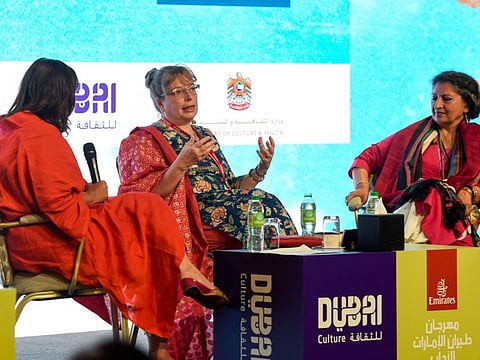'I had 10 questions per page', says English translator of Booker Prize-winning Hindi novel at Emirates Litfest
Geetanjali Shree, Daisy Rockwell share how Ret Samadhi was translated into Tomb of Sand

Dubai: Indian author Geetanjali Shree’s Tomb of Sand, translated by Daisy Rockwell, made history as the first Hindi novel, and the first from South Asia, to win the prestigious International Booker Prize for fiction translated into English.
Speaking at the Emirates Airline Festival of Literature on Saturday, the author and the translator, who shared the 50,000 pound-prize money, revealed how they worked together on translating the original Hindi novel Ret Samadhi into the Booker Prize Winning English version Tomb of Sand.
E-mail communication
In a fascinating conversation about the particular alchemy required to turn a many-layered, intricate novel into an award-winning translation, they revealed that they had never spoken on the phone and their entire interactions were via hundreds of emails. “I think our emails will be double than the book,” Shree said, making the audience laugh.
She said both of them were “very much focused on the work rather than on anything at all.”
For a long time, she even thought that Rockwell was a British citizen since the publisher was from London. “So I assumed she was British for some time, and then discovered, oh, she’s sitting somewhere in America,” said Shree.
Meanwhile, Rockwell said: “We didn’t even ask each other any personal questions, and we didn’t even meet in person until we met in London (on the eve of the award ceremony).”
When the moderator, award-winning Indian journalist Barkha Dutt, asked Rockwell if she ever wanted to know how the person whose book she was translating looks like or sounds like, she replied in negative. “No. We were focused on the book and we were interested in one another’s writing.”
Nuances of Hindi
On interpreting the texture and feelings to the characters by understanding what the original author had kept in her mind, Rockwell said she kept asking questions to understand what Shree had thought in her mind and what she meant while she wrote.
“Literally, at one time I estimated I would ask a minimum of 10 questions per page and those are easy pages and for hard pages, we would go back again and again and again.”
Noted for its deft play on words in Hindi, the book tells the story of an 80-year-old Indian woman’s sudden decision, following her husband’s death, to travel to Pakistan and confront the traumas of her teenage years.
On the difficulties that she found in understanding the nuances of the Hindi language used by Shree, she said. “Everyone says it is experimental, but what do we mean when we say that about her writing? She is always breaking rules and seeing what you can do, how you can push language and how you can push past characters. So she’s breaking things apart and reconstructing them, and that includes grammar and the actual words and she’s creating words, pulling words apart. Sentences are not complete in the expected way.”
She said what made it hard was that she had to ask Shree what she had meant. “Sometimes I really just don’t even know what a sentence means…If you’re reading it casually, you can just gloss over stuff…We do this in any language. But if you are a translator, you have to know what’s going on, and so it was very hard for both of us because she wrote by instinct, and so if I asked her, what did you mean, sometimes she may not necessarily remember. Then she had to research her own work and answer.”
Fighting like a couple
The authors also sent a ripple of laughter among the audience as they revealed how they had “quarreled like a married couple” over choosing the translation of the title, which in Hindi, had a wide range of meanings.
While Rockwell said she finally won, Shree quipped that it was because the publisher was on her side.
Rockwell said people sometimes think that translating the parts about Partition and what people had gone through at that time was most difficult for her. However, that was not the case, she said. Though she did not know the book deals with partition at the time she had agreed to translate it, she said it was not hard for her as she had translated many works about Partition including Krishna Sobti’s Hindi novel A Gujarat Here, A Gujarat There.
The session also saw Shree reading a part from the book which is about family bickering and then Rockwell reading the English translation of that portion.
Sign up for the Daily Briefing
Get the latest news and updates straight to your inbox



